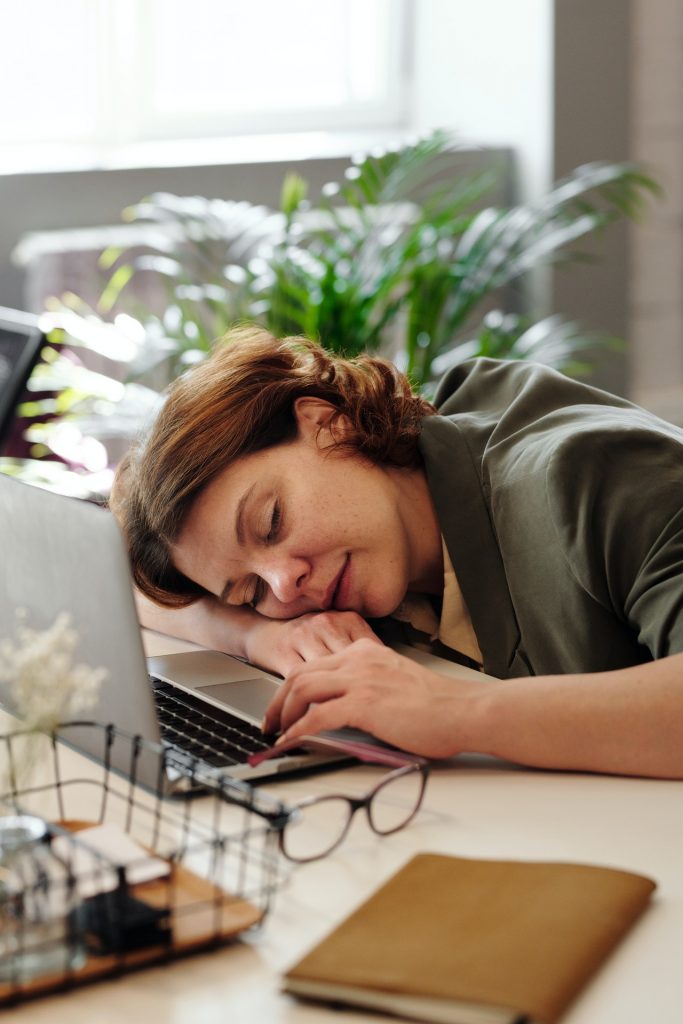For busy people with hectic schedules, daytime sleepiness can prevent you from fulfilling your duties to the best of your ability, reducing concentration levels, decreasing productivity and making you feel fatigued.
Sure, most people reach for an energy drink or that extra cup of coffee, but consuming excess caffeine can lead to sleepless nights, resulting in a vicious cycle of bad sleep. Fortunately, there are ways to prevent sleepiness that don’t involve stimulants; these 5 IDEAL ways to stop daytime sleepiness.
Implement An Effective Bedtime Routine
Let’s put it plainly; the best way to prevent daytime sleepiness is by catching enough zzz’s the evening before. During the daytime, a whole host of inputs are out there, ready to get your mind going. Although they may not prevent sleepiness during the day, they are enough to stimulate your brain and prevent it from going into sleep mode at night.
Implementing an effective bedtime routine that works for you can train your mind and body to switch off when it gets to bedtime. Try to avoid caffeine and other stimulants in the evening, and dim the lights to create a mellow atmosphere. Listening to music, practising meditation, or having a soak in the tub are suitable additions to an effective bedtime routine.
Read: 5 IDEAL steps to the perfect bedtime routine

Knock Naps On The Head
Hey, we all love a nap, and sometimes, it’s necessary. But everything in moderation, as they say, and this certainly applies to catching a few minutes of sleep in the middle of the day. A longer siesta on the sofa can have detrimental effects on your sleep at night, make no mistake.
Indeed, it’s all about the length of your nap, here. According to the Sleep Foundation, a nap of between ten to twenty minutes shouldn’t pose any problems. But they caution that any more than that could cause problems with your sleep cycle. This is particularly true for naps taken after 2 pm, which ‘’may affect your ability to fall asleep at a reasonable time later that night, potentially disrupting your nocturnal sleep cycle’’.
If you are going to nap, follow the expert’s advice; keep it short and do it early.
Create The Perfect Sleep Environment
If you struggle to get down for the night, you can increase your chances of restful sleep by creating the perfect sleep environment. The optimum temperature for a bedroom is around 16 to 18 degrees. Feeling too warm will make you restless, while a cold room can make it difficult for you to nod off.
Your mattress can have a huge impact on your sleep, too, and as you’ve probably heard before, the average person spends around 33 years in bed. This is reason enough to invest in a comfortable mattress that supports your sleeping style, whether you’re a stomach or side sleeper, an early riser or a night owl.
According to Mattress Research, if you get hot during the night, you might want to consider a latex or memory foam mattress, which boast great breathability. On the flip side, should you suffer from lower back pain, a sprung mattress will likely provide the best support. Consider the unique type of sleeper you are, and hone in on a issue-specific mattress from there.
Finally, your bedroom should be reserved for rest, so you should create a calm and quiet sleep environment. When you are in bed, try to avoid using your phone or watching your favourite series. To stop yourself from giving in to temptation, remove distractions and keep your devices out of reach.
Read: How to create the IDEAL bedroom environment in 5 simple steps
Invest In An Ergonomic Pillow
Snoring and sleep apnea can have a huge impact on the amount of restful sleep you get at night and how sleepy you feel in the day. Investing in an ergonomic pillow that combats snoring can make a tremendous difference to your sleep pattern. There are several excellent anti-snore pillows on the market, some of which have been given the thumbs up from the British Sleep Apnoea Association,
Exercise Regularly
Daily exercise can give you an energy boost in the day and make you feel naturally sleepy in the evening. The NHS states that even a short 15-minute walk can make a huge difference. Not to mention, carrying excess weight can be exhausting, and it strains the heart, which makes you feel tired at times when you likely need more energy.
Conversely, exercising consistently can help you lose excess weight and feel more energetic during the day time, as well as helping regulate your circadian rhythm, leading to better sleep at night. Result.
Speaking of that all-important body block of yours, check out our guide on the best ways to improve your sleeping patterns and circadian rhythm. You won’t regret it!





